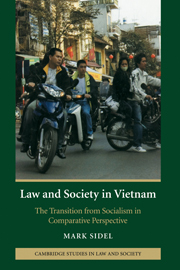Book contents
- Frontmatter
- Contents
- List of tables
- Acknowledgements
- Introduction
- Chapter 1 Constitutionalism and the emergence of constitutional dialogue in Vietnam
- Chapter 2 The emerging debate over constitutional review and enforcement in Vietnam
- Chapter 3 Motorbike constitutionalism: The emergence of constitutional claims in Vietnam
- Chapter 4 Economic law in the service of globalization: Labor law and labor export from Vietnam
- Chapter 5 Law, the press, and police murder: The trial of Lt. Nguyen Tung Duong
- Chapter 6 Law and the regulation of civil society: Nonprofit organizations, philanthropy, grassroots organizations, and the state
- Chapter 7 Testing the limits of advocacy: The emergence of public interest law in Vietnam
- Chapter 8 Donors, law and social justice in Vietnam: The uncertain promise
- Bibliography
- Index
Chapter 1 - Constitutionalism and the emergence of constitutional dialogue in Vietnam
Published online by Cambridge University Press: 07 July 2009
- Frontmatter
- Contents
- List of tables
- Acknowledgements
- Introduction
- Chapter 1 Constitutionalism and the emergence of constitutional dialogue in Vietnam
- Chapter 2 The emerging debate over constitutional review and enforcement in Vietnam
- Chapter 3 Motorbike constitutionalism: The emergence of constitutional claims in Vietnam
- Chapter 4 Economic law in the service of globalization: Labor law and labor export from Vietnam
- Chapter 5 Law, the press, and police murder: The trial of Lt. Nguyen Tung Duong
- Chapter 6 Law and the regulation of civil society: Nonprofit organizations, philanthropy, grassroots organizations, and the state
- Chapter 7 Testing the limits of advocacy: The emergence of public interest law in Vietnam
- Chapter 8 Donors, law and social justice in Vietnam: The uncertain promise
- Bibliography
- Index
Summary
When a Communist Party dominates law and the legal system, what need is there for a Constitution – or, in Vietnam's case, four Party-drafted Constitutions since 1946? A theory of constitutional instrumentalism has dominated scholarly understanding of Vietnam's constitutions and other socialist constitutions since the 1950s. The instrumentalist approach is clear: constitutions in Communist Party-run states have been, and remain, a means of political control by a single party, a way of expressing Communist Party political, economic and social policy, a method for mobilizing action, and a malleable document subject to redrafting and adoption by a compliant legislature as times and policies changed. This analytical framework has dominated foreign as well as Vietnamese understanding of Vietnam's constitutions, as it has dominated our perception of Chinese and other socialist constitutions, and of the Soviet and east European constitutions before the end of Party rule (Vasiljev 1973; Sang 1974; Cohen 1978; Nguyen 1981; Barrett 1983; Saich 1983; Bach and Hoe 1984; Ainsworth 1992; Heng 1992; Thayer 1993; Cai 1995).
Traditional instrumentalist theory remains the lens through which most foreign understanding of Vietnamese, Chinese and other socialist constitutional processes have been understood. Even in earlier decades that doctrine was too simple, though it served some useful analytical purposes as a broad and basic understanding of the constitutional role. But the pure instrumentalist theory is now substantially unsuited to understanding the complexity of constitutional debate in Vietnam and other transitional socialist societies.
- Type
- Chapter
- Information
- Law and Society in VietnamThe Transition from Socialism in Comparative Perspective, pp. 18 - 49Publisher: Cambridge University PressPrint publication year: 2008



